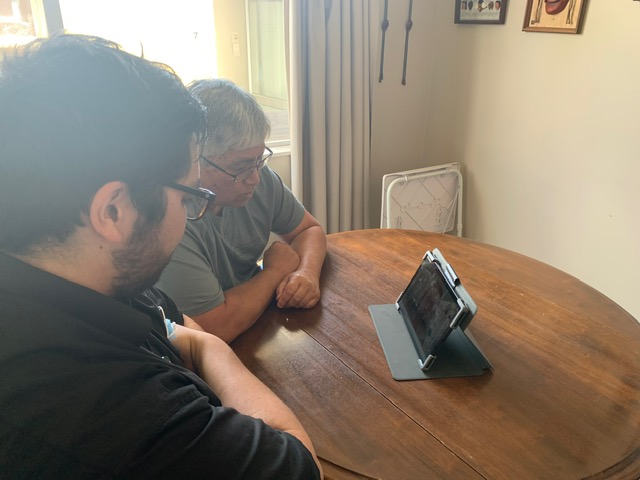Computer literacy for Kiwis with dementia mate wareware a first of its kind

A collaborative project between the Dementia Learning Centre (DLC) and Rotorua Library Te Aka Mauri, with funding from Internet NZ, is proving successful among people with dementia mate wareware in becoming more technologically literate.
In a first for Aotearoa New Zealand, DLC Director Dr Kathy Peri developed a three-phase plan to provide the tools for library staff to bring the digital world to the dementia mate wareware community.
It was in response to carers who wanted a structured approach to supporting people with dementia mate wareware during COVID-19 to be more proficient with technology.
The first phase comprised upskilling library staff on how to become digital mentors for people with dementia mate wareware. The second phase saw them in the community passing on their knowledge of the use of tablets, apps, and the internet.
And finally, a Cognitive Stimulation Therapy (CST) session was delivered with participants on their own devices over Zoom.
The evidence-based, non-pharmacological intervention – which has been available in Aotearoa New Zealand for a decade – improves the quality of life for people with mild to moderate dementia mate wareware.
Delivered by Dementia Learning Centre Director Dr Kathy Peri and School of Medicine Senior Lecturer at the University of Auckland Dr Gary Cheung, the therapy has reached hundreds of Kiwis.
“We opened their minds to a new world. And it shows that while we believe people with dementia are forgetting things, they also still have the capacity to learn new things,” says Rotorua Library Te Aka Mauri Adult Learning, Programmes and Promotions Lead Joanne Dillon.
People became comfortable using YouTube and even downloaded and used the very popular app Seek by iNaturalist, which allows users to identify plants in their gardens just by taking a photo.
Admittedly, Joanne says, some people didn’t see the benefit of the project. But once they saw their whānau navigating a tablet and Zoom, they saw the value.
“Not having had any exposure before to anyone with dementia was a little bit frightening to start with,” Joanne says.
“We didn’t really know what we were getting ourselves into. But I’m really proud of what our team achieved with that project.
“The project highlighted for me that there’s still a window of opportunity for people with dementia to learn and to be stimulated. They deserve to have activities that they can do and enjoy, and that help them have a better quality of life.
“So, it was eye-opening for us. And it reinforced the importance of libraries’ abilities to serve their communities.”
Kathy says the project is important mahi for the dementia mate wareware community, and was an opportunity to prove what support of people living with dementia matewareware to live their best possible lives in their communities looked like.
This is just one of many projects Rotorua Library Te Aka Mauri have initiated in an effort towards becoming Dementia Friendly.
Two new library collections have been developed – the Memory Loss and Dementia Book Collection and Memory Matters which is a lending collection of puzzles, fidget toys and other equipment that can be borrowed for free by adults with dementia mate wareware or their loved ones.
CAPTION: Digital mentor Thomas with Anthony, one of the project participants, preparing for the first virtual CST session

